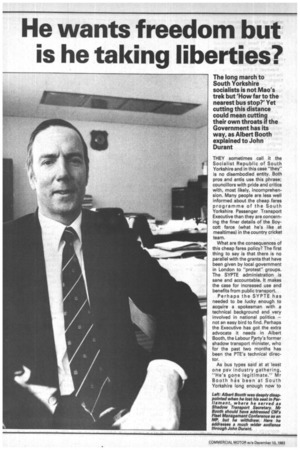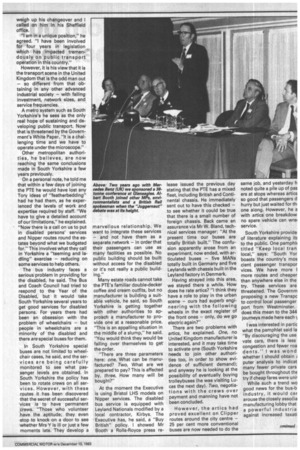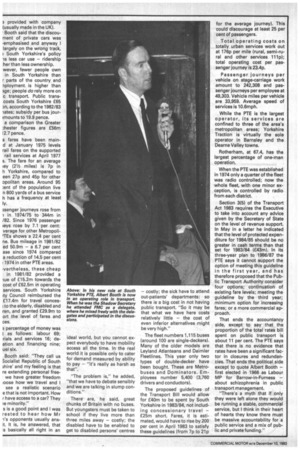He wants freedom but is he taking liberties?
Page 40

Page 41

Page 42

If you've noticed an error in this article please click here to report it so we can fix it.
The long march to South Yorkshire socialists is not Mao's trek but 'How far to the nearest bus stop?' Yet cutting this distance could mean cutting their own throats if the Government has its way, as Albert Booth explained to John Durant
THEY sometimes call it the Socialist Republic of South Yorkshire and in this case "they" is no disembodied entity. Both pros and antis use this phrase; councillors with pride and critics with, most likely, incomprehension. Many people are less well informed about the cheap fares programme of the South Yorkshire Passenger Transport Executive than they are concerning the finer details of the Boycott farce (what he's like at mealtimes) in the country cricket team.
What are the consequences of this cheap fares policy? The first thing to say is that there is no parallel with the grants that have been given by local government in London to "protest" groups. The SYPTE administration is sane and accountable. It makes the case for increased use and benefits from public transport.
Perhaps the SYPTE has needed to be lucky enough to acquire a spokesman with a technical background and very involved in national politics — not an easy bird to find. Perhaps the Executive has got the extra advocate it needs in Albert • Booth, the Labour Party's former shadow transport Minister, who for the past two months has been the PTE's technical director.
As bus types said at at least one psv industry gathering, "He's gone legitimate." Mr Booth has been at South Yorkshire long enough now to weigh up his changeover and I called on him in his Sheffield office.
"I am in a unique position," he agreed. "I have been involved for four years in legislation which has impacted tremendously on public transport operation in this country."
However, it is his view that it is the transport scene in the United Kingdom that is the odd man out — so different from that obtaining in any other advanced industrial society — with falling investment, network sizes, and service frequencies.
A metro system such as South Yorkshire's he sees as the only real hope of sustaining and developing public transport. Now that is threatened by the Government's White Paper. "It is a challenging time and we have to operate under the microscope."
Other metropolitan authorities, he believes, are now reaching the same conclusions made in South Yorkshire a few years previously.
On a personal note, he told me that within a few days of joining the PTE he would have lost any Tory ideas of "featherbedding" had he had them, as he experienced the levels of work and expertise required by staff. "We have to give a detailed account of our limitations," he explained. "Now there is a call on us to put in disabled persons' services and Nipper routes round the estates beyond what we budgeted for." This involves what they call in Yorkshire a "teeming and ladling" exercise — reducing on some services to help others.
The bus industry faces a serious problem in providing for the disabled, he said. The Bus and Coach Council had tried to respond to the Year of the Disabled, but it would take South Yorkshire several years to get good services for disabled persons. For years there had been an obsession with the problem of wheelchairs — but people in wheelchairs are a minority of the disabled and there are special buses for them.
In South Yorkshire special buses are not limited to wheelchair cases, he said, and the services are being carefully monitored to see what passenger levels are obtained. In South Yorkshire the policy has been to rotate crews on all services. However, with these routes it has been discovered that the secret of successful services is to have permanent crews. "Those who volunteer have the aptitude; they even stop to knock on a door to see whether Mrs Y is ill or just a few moments late. They develop a
marvellous relationship. We want to integrate these services — and not have them as a separate network — in order that their passengers can use as many facilities as possible. No public building should be built without access for the disabled or it's not really a public building."
Many estate roads cannot take the PTE's familiar double-decker coffee and cream outfits, but no manufacturer is building a suitable vehicle, he said, so South Yorkshire is getting together with other authorities to approach a manufacturer to provide one at a reasonable price. "This is an appalling situation in the middle of a slump," he said. "You would think they would be falling over themselves to get the order.
"There are three parameters here: one, What can be manufactured? Two, What are we prepared to pay? This is affected by, three, How many will be bought?"
At the moment the Executive is using Bristol LHS models on Nipper services. The disabled bus service is equipped with Leyland Nationals modified by a local contractor, Kirbys. The Executive has, he said, a "Buy British" policy. I showed Mr Booth a Rolls-Royce press re
lease issued the previous day stating that the PTE has a mixed fleet, including British and Continental chassis. He immediately sent out to have this checked — to see whether it could be true that there is a small number of foreign chassis. Back came an assurance via Mr W. Bland, technical services manager: "At the present time our buses are totally British built." The confusion apparently arose from an experiment, now ended, with articulated buses — five MANs totally built in Germany and five Leylands with chassis built in the Leyland factory in Denmark.
Having strayed into this area, we stayed there a while. How does he rate artics? "I think they have a role to play in the urban scene. — ours had superb engineering with the following wheels in the exact register of the front ones — only, do we go electric again?"
There are two problems with artics, he explained. One, no United Kingdom manufacturer is interested, and it may take time to activate one (South Yorkshire needs to join other authorities too, in order to show evidence of sufficient demand); and anyway he is looking at the possibility of eventually buying trolleybuses (he was visiting Lucas the next day). Two, negotiations with the crews over payment and manning have not been concluded.
However, the artics had proved excellent on Clipper routes around the city centre — 25 per cent more conventional buses are now needed to do the
same job, and yesterday h noted quite a pile up of pas ers at stops whereas artics so good that passengers d hurry but just waited for th, one along. However, he a with artics one breakdow no spare vehicle can wrei service.
South Yorkshire provide of literature explaining its to the public. One pamph1( titled "Keep local tran local," says: "South Yor boasts the country's mos cient passenger transpor vices. We have more 1 more routes and cheaper than anywhere else in the try. These services are threatened. The Governm proposing a new Transpc to control local passenger port from Westminster. does this mean to the 344 journeys made here each
I was interested in partic what the pamphlet said la "By discouraging the use vate cars, there is less congestion and fewer roa dents." I was wond whether I should obtain puter analysis to indicat many fewer private cars be bought throughout ths try if cheap fares were uni,
While such a trend wo good news for the bus-b industry, it would cer arouse the closely asso6ia manufacturing lobby that a powerful industria against increased taxati
3 provided with company (usually made in the UK).
• Booth said that the discoument of private cars was -emphasised and anyway I largely on the wrong track, South Yorkshire's policy is less car use — ridership her than less ownership. wever, fewer people own in South Yorkshire than parts of the country and iployment is higher than age; people do rely more on c transport. Public transcosts South Yorkshire £65 )n, according to the 1982/83 iates; subsidy per bus jourmounts to 19.9 pence.
a comparison the Greater :.hester figures are £56m 12.7 pence.
s fares have been main
d at January 1975 levels rail fares on the supported rail services at April 1977 s. The fare for an average ley (21/2 miles) is '7p in h Yorkshire, compared to een 27p and 45p for other opolitan areas. Around 95 ;ent of the population live n 800 yards of a bus service h has a frequency at least ly.
3senger journeys rose from in 1974/75 to 344m in /82. Since 1976 passenger ieys rose by 7.1 per cent: verage for other Metropoli'TEs shows a 22.4 per cent ne. Bus mileage in 1981/82 ed 50.9m — a 6.7 per cent ase since 1974 compared a reduction of 14.5 per cent 1974 in other PTE areas.
vertheless, these cheap in 1981/82 provided a me of £15.2m towards the cost of £62.5m in operating services. South Yorkshire [ty Council reimbursed the £17.4m for travel conces; to the elderly, disabled and ren, and granted £29.9m to ort the level of fares and ces.
a percentage of money was t as follows: labour 69; rials and services 16; deation and financing nine; uel six.
Booth said: "They call us socialist Republic of South ;hire' and my feeling is that re extending personal free we have greater freedom oose how we travel and I see a realistic scenario e that is not important. How have access to a car? They le minority."
s is a good point and I was rested to hear how Mr i's opponents usually ansit. It is, he answered, that Is basically all right in an ideal world, but you cannot expect everybody to have mobility access all the time. In the real world it is possible only to cater for demand measured by ability to pay — "it's really as harsh as that".
"The problem is," he added, "that we have to debate sensibly and we are talking in slump conditions."
There are, he said, great chunks of Britain with no buses. But youngsters must be taken to school if they live more than three miles away — costly; the disabled have to be enabled to get to disabled persons' centres — costly; the sick have to attend out-patients' departments: so there is a big cost in not having public transport. "So it may be that what we have here costs relatively little — the cost of even inferior alternatives might be very high."
The fleet numbers 1,115 buses (around 100 are single-deckers). Many of the older models are Leyland Atlanteans and Daimler Fleetlines. This year only two types of double-decker have been bought. These are Metrobuses and Dominators. Employees number 5,400 (3,760 drivers and conductors).
The proposed guidelines of the Transport Bill would allow for £40m to be spent by South Yorkshire in 1983/84, not including concessionary travel — £25m short. Fares, it is estimated, would have to rise by 200 per cent in April 1983 to satisfy these guidelines (from 7p to 21p for the average journey). This could discourage at least 25 per cent of passengers.
Total operating costs on totally urban services work out at 176p per mile (rural, semi-rural and other services 1110; total operating cost per passenger journey is 23.4p.
Passenger journeys per vehicle on stage-carriage work amount to 242,308 and passenger journeys per employee at 49,303. Vehicle miles per vehicle are 33,959. Average speed of services is 10.6mph.
While the PTE is the largest operator, its services are confined to three of the area's metropolitan areas; Yorkshire Traction is virtually the sole operator in Barnsley and the Dearne Valley towns.
Rotherham, at 67.4, has the largest percentage of one-man operation.
When the PTE was established in 1974 only a quarter of the fleet was radio controlled; now the whole fleet, with one minor exception, is controlled by radio from each district.
Section 3(5) of the Transport Act 1983 requires the Executive to take into account any advice given by the Secretary of State on the level of revenue support. In May in a letter he indicated that the level of protected expenditure for 1984/85 should be no greater in cash terms than that set for 1983/84 (£43m). In its three-year plan to 1986/87 the PTE says it cannot support the option of meeting this guideline in the first year, and has therefore proposed that the Public Transport Authority consider four options; continuation of existing fare levels; meeting the guideline by the third year; minimum option for increasing fares; or a more commercial approach.
That ends the accountancy side, except to say that the proportion of the total rates bill spent on public transport is about 11 per cent. The PTE says that there is no evidence that rates have been a significant factor in closures and redundancies. That ends the political side except to quote Albert Booth — first elected in 1966 as Labour MP for Barrow-in-Furness — about schizophrenia in public transport management.
"There's a myth that if only they were left alone they would be running a stable, commercial service, but I think in their heart of hearts they know there must be massive accountability for a public service and a mix of public and private funding."












































































































